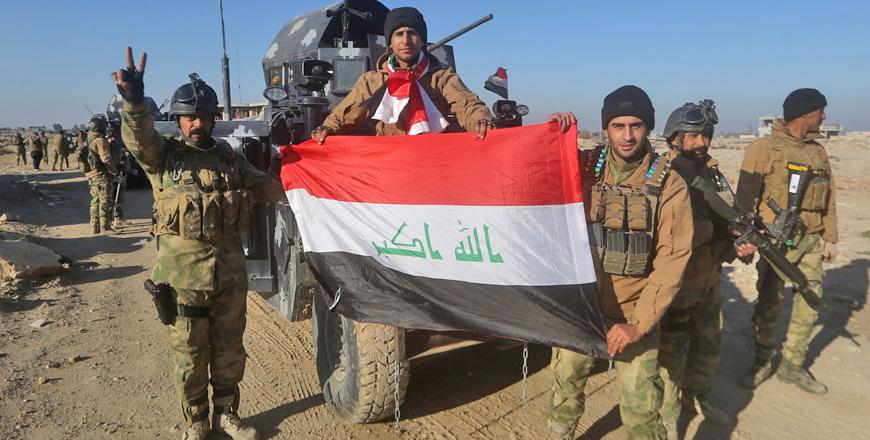You are here
Militants, booby-trapped houses in Ramadi to delay civilians’ return
By Reuters - Dec 30,2015 - Last updated at Dec 30,2015

Members of Iraq’s elite counterterrorism unit pose with their national flag on Tuesday in the city of Ramadi, the capital of Iraq’s Anbar province, about 110 kilometres west of Baghdad, after Iraqi forces recaptured it from the Daesh terror group (AFP photo)
BAGHDAD — About 700 Daesh militants were believed to be hiding in the centre and eastern outskirts of Ramadi on Wednesday, three days after Iraqi government forces claimed victory over the militants in the western city, the US-led coalition said.
The UN refugee agency, assisting families who have left the Anbar provincial capital, said that despite gains by security forces, conditions were not yet good enough for tens of thousands of displaced residents to return.
Much of the centre of Ramadi — which previously had a population exceeding 400,000 — still needs to be cleared of explosives laid by the insurgents who seized the city 100km west of Baghdad in May, the coalition said.
After months of cautious advances backed by coalition air strikes, the Iraqi army retook Ramadi on Sunday — its first big victory against the extremists since they swept through a third of Iraq in mid-2014.
"Within what we call central Ramadi, they estimate still up to 400 Daesh members, and then, once you go east of that towards Fallujah, you've got about 300 out there in that direction," US Army Captain Chance McCraw, a coalition intelligence officer, told reporters in Baghdad.
Security sources said insurgents clashed with federal police and tribal fighters on Wednesday in Husaiba Al Sharqiya and Jweba, on the eastern fringes of Ramadi. There was no immediate confirmed information on casualties.
“In central Ramadi the house-borne IED [improvised explosive device] continues to be a threat even once CTS [counterterrorism service] goes through and that’s why you don’t see civilians moving back into various areas,” McCraw said.
Prime Minister Haider Al Abadi on Wednesday ordered the immediate formation of a high-level committee including the Anbar governor and senior federal government officials to stabilise and rebuild Ramadi.
He called for the immediate removal of explosives and the restoration of basic services to allow the safe return of civilians to their homes.
The United Nations estimates initial reconstruction needs in Ramadi require about $20 million, but the longer term outlay is likely to be much greater for a city battered by US air strikes and Daesh explosives over the past six months.
“Areas are still insecure, littered with IEDs, and there has been extensive damage of public buildings and houses. Electricity and water services have been damaged,” the UN refugee agency UNHCR said in a statement on Wednesday.
The Iraqi trade ministry said it was preparing to send emergency food aid to Ramadi.
Holding land
Some districts of the city are littered with explosives.
McCraw said that in one of the more heavily defended areas, Iraqi forces had found about 300 explosives planted along a 150-metre stretch south of the main government complex. After clearing that area, they found more bombs scattered every 50 metres or so, he said.
Nearly 1.4 million people have been displaced from all of Anbar province, according to UN estimates. Iraq’s government says most civilians fled Ramadi before its assault on the city.
McCraw and other coalition officials declined to estimate how long it would take Iraqi forces to secure the whole city. They said about 400 members of the Anbar police had arrived to help hold areas cleared by better trained and equipped counterterrorism forces that spearheaded the Ramadi operation.
Abadi has pledged to retake Mosul, 400km north of Baghdad, next year and said this would deal a final blow to Daesh. It is the largest Iraqi city under the group’s control and is expected to be harder to recapture than Ramadi.
Baghdad has said Sunni Muslim tribal fighters will make up the main holding force in Ramadi, a role played in other areas taken from Daesh by mainly Iranian-backed Shiite Muslim armed groups, but the latter were held back from Ramadi for fear of stoking sectarian tensions.
The coalition said its advisers were not on the ground during the Ramadi battle but provided training and equipment to Iraqi forces.
Related Articles
BAGHDAD — Iraq has for the first time deployed troops trained by the US-led coalition in their campaign to retake the city of Ramadi from Da
BAGHDAD — A wave of 15 suicide car bomb attacks by the Daesh terror group against Iraqi security forces was repelled east of the flashpoint
BAGHDAD () — Dozens of families the Daesh terror group had been using as human shields in Ramadi escaped to safety Wednesday as Iraqi forces

















